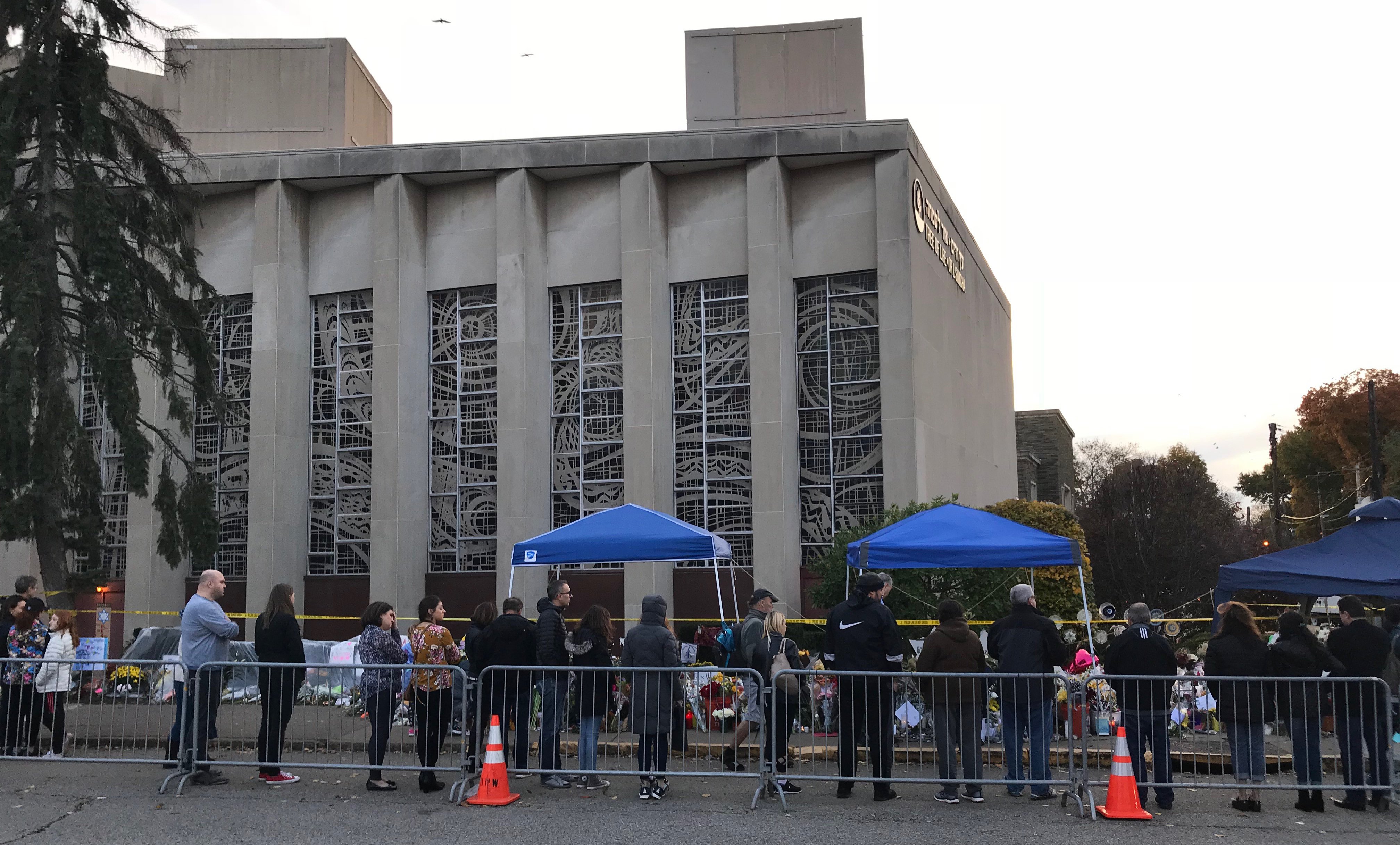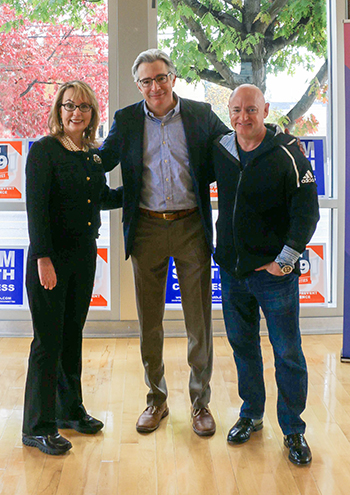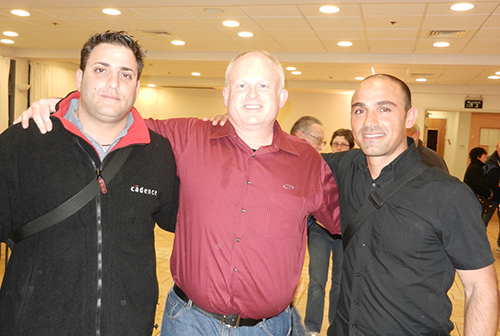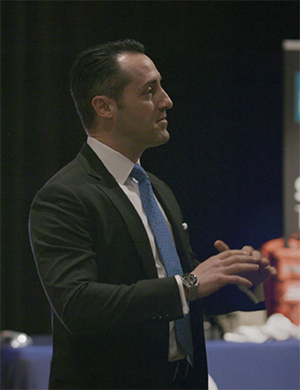
Firearms Owners Against Crime
Institute for Legal, Legislative and Educational Action

Institute for Legal, Legislative and Educational Action
Yocheved is a gun-owning Jewish mother who thinks it’s not anyone’s business—not even her rabbi’s—if she decides to carry a weapon to Rosh Hashanah services this year. She doesn’t know if any other gun owners in her community are armed when they attend services at her Orthodox shul in Dallas, but she believes they are. Yocheved, who moved to Texas from California about two years ago, in part because of less stringent gun laws, thinks her community would be safer if all Jews concealed a weapon under their clothing or tallit.

People visit the memorials to victims of the mass shooting at the Tree of Life synagogue in Pittsburgh.
“I would feel very comfortable if I went into synagogue and everybody had concealed carry,” said the 57-year-old, who asked that her last name not be used because she fears for her safety. “The bad guy would probably know that and would not use that synagogue as a target.”
Yocheved became a strong supporter of guns in synagogue after personally experiencing anti-Semitic threats when she spoke publicly about her love for Israel. With the recent shootings inside and outside congregations in Pittsburgh, Poway, Calif., and Miami, more and more Jews in the United States feel that their institutions are under threat—and that armed guards and even armed congregants may be the only way to assure their safety.
Violent anti-Semitism is not a new experience for American Jews. In the 1950s and ’60s, for example, a wave of white supremacist bombings hit synagogues in the South. Another wave of violence hit Jewish institutions in the West in the late 1990s and early 2000s.
Many communities responded to the attacks by hiring guards and locking their doors full-time. But the nationwide movement to strengthen security didn’t seem to infuse every community—big and small, rural and urban—until the deadly shootings over the past year in Pittsburgh and Poway. After those attacks—11 were murdered at the Tree of Life synagogue in Pittsburgh in October 2018 and one at Chabad of Poway in April of this year—American Jews began waking up once again to the very real threat of anti-Semitic violence in their places of worship. These fears are compounded by a rise in the number of mass shootings at schools, clubs, shopping malls and other public spaces.

Rabbi Daniel Weiner (center) lobbied for stronger gun laws in Washington State alongside former Congress-woman Gabby Giffords and her husband, Mark Kelly, an astronaut running for the U.S. Senate.
Not only has the debate over how best to secure our synagogues become more widespread, but the tone and content of that discussion has changed. In addition to armed guards, the conversation in many Jewish institutions now includes how and when to conduct lockdown and exit drills and whether synagogues should allow congregants to carry concealed weapons to either assist or replace professional security. And while there are no hard numbers on any of these developments, experts suggest that an increasing number of Jews are arming themselves in the belief that they must be prepared to defend themselves and their fellow congregants in the event of an attack.
How did we go from simply promoting tighter gun laws—as, for example, many Jews in the Seattle area did in the aftermath of a deadly shooting at the Jewish Federation of Greater Seattle in 2006—to debating if we should share our sanctuaries with friends and family members with Glocks concealed under their jackets?
The answer is complicated. The debate over weapons in synagogues is not simply an argument between Second Amendment die-hards and liberals fighting for stronger gun laws. It involves rising anti-Semitism, easier access to firearms and concealed carry permits, different laws in different states, as well as political rhetoric, hate speech and a social media free-for-all amplifying all the above. This includes white nationalists who have excelled at using social media to share their message and recruit new followers.
The gun debate is “just another example of how the Jewish community reflects society in general,” said Amy Asin, director of Strengthening Congregations for the Union for Reform Judaism.
Darla Kashian, a 55-year-old mother of a 9-year-old son and a 12-year-old daughter living in St. Paul, Minn., tweeted after a shooting at a summer festival in California earlier this year that her children are afraid at school, they’re afraid at synagogue and afraid at big events. A financial adviser, Kashian has long advocated for stronger gun laws and is on the safety committee at Shir Tikvah, a Reform congregation in Minneapolis. “Why do you keep taking me to unsafe places?” she quoted her daughter saying to her.
Dr. Murray Zedeck, an 82-year-old retired family physician and gun owner with residences in Florida and Colorado, agrees there is a need to strengthen gun laws. But he does not believe the Second Amendment should be blamed for violence in America.
“Guns don’t kill people any more than knives or indeed cars. It’s people that kill with the tools they have at hand,” he said. “The solution is to enforce and strengthen laws already in existence and not attack good people with guns.”
All the major American Jewish denominations have advocated for tightened gun laws. But all the groups—Orthodox, Conservative, Reform and Reconstructionist—leave individual choices about security up to their member synagogues.
In about one in five hate crimes in the United States, the victims are targeted on the basis of religion. Of the 1,749 victims of anti-religious hate in 2017, 58 percent were attacked because of anti-Jewish bias, according to the FBI. Anti-Muslim bias is a distant second, making up 18.6 percent of anti-religious hate crimes in that same year.

Jim Elliot (center), chief deputy at a Chicago area sheriff’s office, with security officers during a synagogue trip to Israel
While some synagogue leaders have made headlines recently by stating publicly that they are in favor of arming congregants, they appear to be in the minority. And law enforcement experts offer many reasons why they think that is a bad idea.
The notion of armed congregants “just scares the heck out of me,” said Jim Elliot, chief deputy at a county sheriff’s office in suburban Chicago who also serves on the Facilities and Public Safety Committee at Temple Chai in Long Grove, Ill. His Reform temple decided to ban guns from the building and hire armed security after Illinois changed its laws in 2013 to permit the public to carry concealed weapons. The board hired off-duty law enforcement officers to guard the building on Shabbat, during religious school and other times the building gets heavy use.
Armed congregants would be a big problem for law enforcement during an active shooter situation, Elliot explained. They don’t want civilians walking around the temple shooting at each other, making it potentially difficult to pinpoint an attacker. “The bad guy is probably not walking around wearing a hat saying, ‘I’m the bad guy,’ ” he said.
Elliot lists several other reasons to ban guns from inside a synagogue. They are an insurance liability for the congregation. Allowing guns inside means any visitor could bring a weapon to shul, not just the people chosen to help with security. In addition, the requirements for a concealed weapon permit includes only minimal training in most states. Just because someone has experience target shooting or might even be ex-military doesn’t mean they have the abilities of a police officer in a stressful situation, he said. “I could have been a cook in the military. That doesn’t mean I’m able to deal with an active threat.”
In 2004, the Jewish Federations of North America and the Conference of Presidents of Major American Jewish Organizations formed the Secure Community Network, known as SCN, to address both growing domestic anti-Semitism and FBI reports of threats from foreign terrorists. The group helps synagogues and other Jewish organizations assess threats, make security plans and train staff and volunteers. It also works with the FBI and Department of Homeland Security to connect the dots on perceived threats and share information widely among American Jewish institutions.
“We’ve gotten very good, unfortunately, at understanding those threats,” said Michael Masters, national director and CEO of SCN, who previously served as executive director of the Department of Homeland Security and Emergency Management for Cook County, Ill. He said synagogues have been targeted by both home-grown and international terrorists because they are a symbol of Jewish life as well as the place where more Jews gather than any other American Jewish institution.
The father of two young daughters, Masters said the single goal of his organization is clear: “We want to make sure no one questions dropping kids off at school, sending them to camp or walking into shul.”

Michael Masters, national director of Secure Community Network
Acknowledging that organizations need to make their own decisions about concealed carry and armed security guards, Masters echoed Elliot in cautioning community leaders to think hard before allowing anyone not professionally trained in law enforcement to bring in guns. In some areas of the country, like the South, where the Pew Research Center says 36 percent of people own guns, the debate over congregants bringing weapons into the sanctuary is more common. According to Masters, this practice, along with the debate itself, is much less prevalent in other parts of the country. However, there are exceptions, with a lively debate raging in some Jewish, particularly Orthodox, communities in the New York and New Jersey area.
Zedeck, the retired physician who is licensed to carry a concealed handgun in Florida and Colorado, thinks the tide is shifting toward more acceptance of gun ownership among Jews. He may or may not be armed when he walks into either of the two congregations he belongs to in Colorado and the North Miami area, the site of a recent drive-by shooting of a man outside a local synagogue. Zedeck declined to name his synagogues, but said he is not a frequent attendee at either one.
Even though he supports tougher gun laws, such as background checks, Zedeck said, “My very liberal friends would say I’m a gun nut.”
Zedeck, who grew up in Brooklyn, N.Y., thinks community attitudes about guns changed after the creation of the State of Israel and again when concealed carry permits became easier to obtain in Florida in the 1980s and in the 2000s in Colorado. Gun laws vary from state to state, but more than 30 states, including those where Zedeck lives, have some form of reciprocal agreements allowing someone with a concealed carry permit in one state to bring it to another state.
People respect strength, he said. “People respect the State of Israel, not because they like Jews but because it’s strong.”
Gun owner David Shatz, 58, of Cherry Hill, N.J., is not interested in carrying a gun to shul himself but said he would feel a lot safer if fellow congregants, particularly those with military backgrounds, were allowed to do so, which they’re not. Since the Pittsburgh shooting, his modern Orthodox synagogue, Congregation Sons of Israel, has hired an armed guard to stand out front every Shabbat as well as on holidays and other events. Members are now required to use a key fob to enter the building and visitors have to buzz and wait at the door. The congregation installed a reinforced gate and concrete pylons this summer to further improve the synagogue’s security.
“My synagogue prior to the shooting in October was probably as vulnerable as any other synagogue in America,” said Shatz, who works for a car donation organization. “People could walk in. Nobody questioned who you were.”
Yocheved, the Dallas gun owner, who has her own marketing firm, practices regularly at an indoor shooting range. The recent spate of shootings at schools, synagogues, churches and public spaces has left her feeling continually frightened. She believes one of the most dangerous places for Jews today is in shul. “There have been times when I have not gone to synagogue because I was afraid,” she admitted. “If I can’t feel protected in synagogue, there’s a problem with our country.”
Rabbi Daniel Weiner of Temple de Hirsch Sinai in Seattle doesn’t buy these pro-gun arguments. He called arming congregants a “misplaced, delusional idea.” He said that if trained police officers generally hit their mark less than 30 percent of the time, according to a study of the New York Police Department, then why would nonprofessionals expect to make a difference in the stressful moments of a synagogue attack.
His large Reform congregation, which is split between two campuses, has had armed guards outside their buildings every day for decades, in part because the campuses are on the edge of a high-crime neighborhood. Even in the wake of the Pittsburgh and Poway attacks, the congregation has not reconsidered its no-weapons-in-the-buildings policy.
After the Seattle Federation shooting, Weiner became a leader in the fight for tighter laws to keep guns out of the hands of abusers, teens and the mentally ill. He worries that congregants with guns are more likely to kill another member than an armed assailant. He cited a 2007 incident in a Dallas synagogue, when the accidental discharge of a weapon during Erev Rosh Hashanah services injured the gun owner’s adult daughter and two other congregants.
Weiner called on Jews everywhere to be more thoughtful and deliberate and not give in to their fears. “There’s just no need for firearms in a congregation,” he said. “We take security incredibly seriously.”
He said that security experts told his synagogue that having an armed guard outside the building “hardens the target,” making it less likely to be attacked, because potential shooters are driven to try somewhere else. Having an unknown number of amateur gun owners inside does not have the same impact, Weiner said.
Asin from the URJ acknowledged that security decisions are easier at well-funded congregations like Temple de Hirsch Sinai. In smaller towns, where the local police force doesn’t patrol on a regular basis, or at less wealthy synagogues that can’t afford trained security officers, the decisions are more complex. But many communities have overcome these challenges by forging strong relationships with local law enforcement or forming cooperatives with other congregations.
Jim Elliot, the chief deputy in the Chicago suburbs, said that every synagogue should work toward strengthening its relationship with local law enforcement. Reach out, welcome them into the building for a cup of coffee or make known that they can use the facilities for a bathroom break while doing their neighborhood rounds, he said.
Paying for security is an important part of the plan, but only one part, Elliot said. Security hardware, well-trained volunteers and general community awareness are also essential to any good synagogue security plan, he said.
Inspiring a congregation to be responsible for its own security is the goal of another national group, the Community Security Service, which since 2007 has been quietly training volunteers across the nation to protect Jewish spaces by teaching them to identify threats and work with police.
While the Secure Community Network focuses on nationwide and local threat assessment, CSS focuses on training volunteer security and increasing community member awareness. Like SCN, CSS does not encourage volunteers to carry guns.
“We started with 10 volunteers in New York,” said Jason Friedman, executive director of the New York-based CSS. “Just by word of mouth, we have grown and grown and grown.” He said CSS has trained more than 4,000 security volunteers in New York, New Jersey, Washington, D.C, Maryland and California and recently started groups in other states in other parts of the country.
Ten years ago, people were saying we don’t even need security, the Navy reservist recalled. Now many want to take personal responsibility for their own safety. He believes the growth of his organization is evidence that the conversation around synagogue security has changed.
This is hard work requiring dedication and time for training as well as making sure participants remain aware and engaged. It’s more difficult and complicated than debating whether guns should be allowed in sanctuaries and communal spaces, he asserted. “Sometimes, the gun debate hides a little bit of laziness.”
Donna Gordon Blankinship is a freelance writer based in Washington State.
https://www.hadassahmagazine.org/2019/09/04/active-security-gun-debate-comes-synagogue/